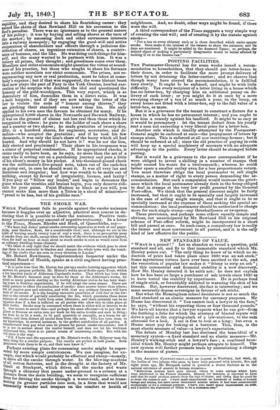POSTING FACILITIES.
THE Postmaster-General has for some weeks issued a recom- mendation to householders, that they should put letter-boxes to their doors, in order to facilitate the more prompt delivery of letters by not detaining the letter-carrier; and we observe that though many have obeyed the recommendation, it is fulfilled very slowly. It ought to be enforced, and might be with little difficulty. Tax every recipient of a letter living in a house which has no letter-box, by charging him an additional penny on de- livery of each letter ; or you might do it at once by a more sweeping charge of a tax of so much a year, in the lump, on every house not fitted with a letter-box, say to the full value of a letter-box, or more.
But it is a grievance for the tenant to construct a fixture for a house in which he has no permanent interest ; and you ought to give him a remedy against his landlord. It might be as easy as it would be peremptory : let the tenant deduct from his yearly rent a sum not exceeding a very liberal price for a letter-box.
Another rule which is timidly attempted by the Postmaster- General might be enforced at once—the prepayment of letters by stamps alone. This is enforced at all new receiving-houses ; but it should be enforced at all ; since the old practice of paying in coin will keep up a special machinery of accounts with no adequate advantage to the public. Every letter should be stamped before posting.
But it would be a grievance to the poor correspondent if he were obliged to invest a shilling in a number of stamps that might exceed his wants for a twelvemonth ; whereas he could better spare a smaller outlay even for a less proportionate return. You must therefore oblige the local postmaster to sell single stamps, as a matter of right to every person demanding the ac- commodation. But such a compulsion would increase the griev- ance which the local postmaster already feels in the being obliged to deal in stamps at the very low profit granted by the General Post-office. We think that the general discount might be fairly increased, but that it ought to be specially and largely increased in the case of selling single stamps, and that it ought to be so specially increased at the expense of those seeking the special ac- commodation : the local postmaster should be authorized to charge more for each single stamp—say threehalfpence or twopence.
These provisions, and perhaps some others equally simple and obvious, not unanticipated by Mr. Rowland Hill in his original scheme of Post-office reform, might be incorporated in a short bill and passed at once. In such cases, a compulsory law is really the fairest and most convenient to all parties, and it is the only kind of law effective for the public.


























 Previous page
Previous page